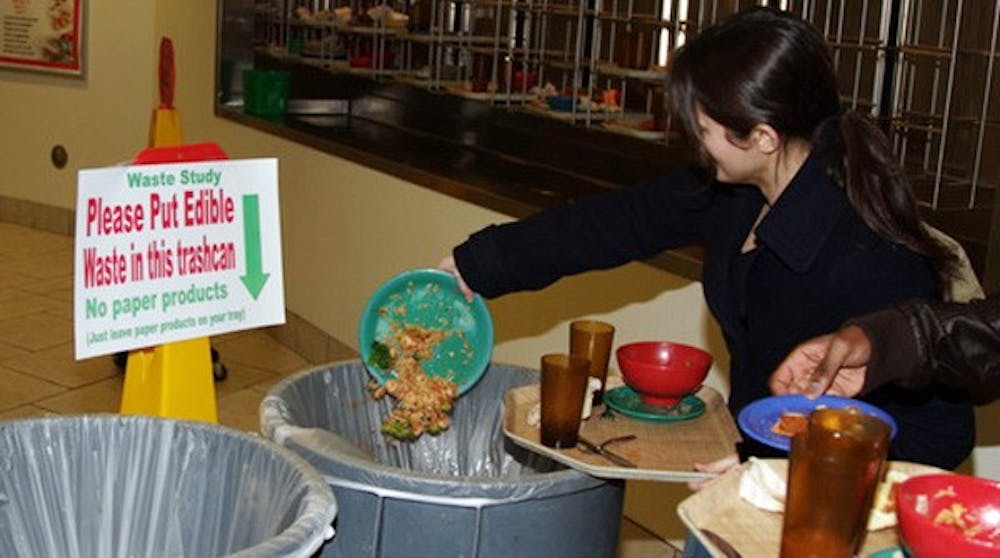Cut down on food waste by spring break, and the dining hall trays stay.
That's the counteroffer from the University of Richmond's Sustainability Working Group, which has delivered its decision after members of the student governments charged student opinion wasn't adequately considered before going permanently trayless was approved in November.
Trays will now remain at least through spring break, except on Fridays -- a continuation of a trayless effort initiated this fall. The working group said it would use Fridays to add in student suggestion.
The new plan calls for students appointed by the government associations to survey the amount of food waste in dining hall trash cans, though it was not immediately clear how often. Dining services officials said in December that audits had shown more than 714 pounds of food could be saved weekly by eliminating trays.
Early audits would establish goals for reducing waste and would be followed by a voluntary community effort to achieve them. Under the plan, the trays would remain the second half of the spring semester if the waste reduction met the benchmarks by spring break. That would continue through 2009-10 because officials are aiming to instill solid conservation habits in the incoming class, chief of staff Lori Schuyler wrote in an e-mail.
In the e-mail, addressed on Tuesday to Matthew Whittaker, president of the Richmond College Student Government Association, Schuyler called on the student governments to back full trayless dining should the voluntary campaign not be deemed successful. The e-mail was also sent to members of the committee and Generra Peck, president of the Westhampton College Government Association.
"If the student government associations are willing to wage a campaign to reduce waste, we are happy to postpone the full implementation of trayless dining," Schuyler wrote, speaking on behalf of the environmental committee.
Pushing a voluntary campaign would groom students to take personal responsibility for conservation, an effect an administrative mandate would not offer, student leaders said.
The deal bucks a broader push to enact sustainability initiatives promptly on campus and meet requirements set by the President's Climate Commitment, signed by President Edward Ayers in 2007. In December, school officials said installation of energy monitors would be finished, complemented by a two-month recycling initiative sponsored by the RENEW/Sierra Club.
But the new trayless plan was sparse on details about how the student governments and dining services would carry out the campaign. Those decisions, Whittaker said, would be made between dining services officials, Schuyler and student government representatives during the coming weeks.
RCSGA leaders nevertheless expressed hope that refusing a tray would be viewed just as normally as taking one after the campaign.
Schuyler announced the committee's decision to eliminate trays at a heated Dec. 3 meeting with both student governments. In response, Whittaker and Peck offered an alternate plan the following day to Schuyler, Ayers, the deans of Richmond and Westhampton colleges and Steve Bisese, vice president for student development, Whittaker said.
Enjoy what you're reading?
Signup for our newsletter
Student government leaders pushed for a voluntary waste reduction program -- which would include an educational component about the benefits of minimizing waste -- to last through the spring semester.
They stopped short of agreeing to support a full trayless initiative should the reductions be considered too small, setting the stage for future disagreements with the committee.
"We have gone from a trial period of trayless Fridays, to a period of no trayless days, to a potential period of a trayless semester," the RCSGA proposal reads. "This may prove to be a crude transition into a very impactful aspect of campus life."
Students vexed over the decision to eliminate trays have primarily charged that removing them is an unnecessary inconvenience, sentiments that have heartily echoed by some faculty and staff, dining officials say.
Contact staff writer Dan Petty at dan.petty@richmond.edu
Support independent student media
You can make a tax-deductible donation by clicking the button below, which takes you to our secure PayPal account. The page is set up to receive contributions in whatever amount you designate. We look forward to using the money we raise to further our mission of providing honest and accurate information to students, faculty, staff, alumni and others in the general public.
Donate Now



